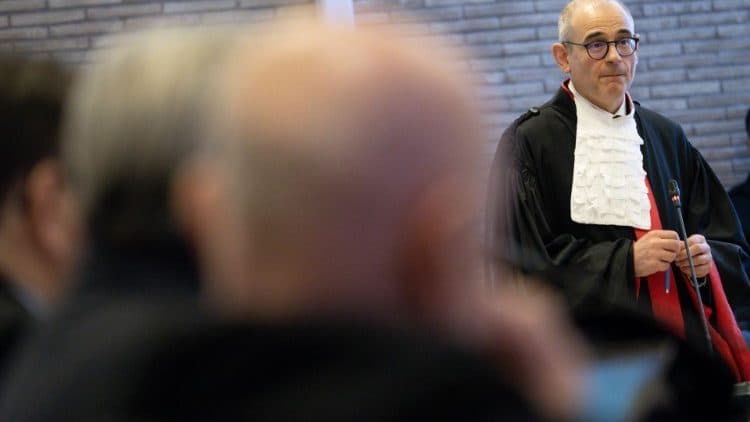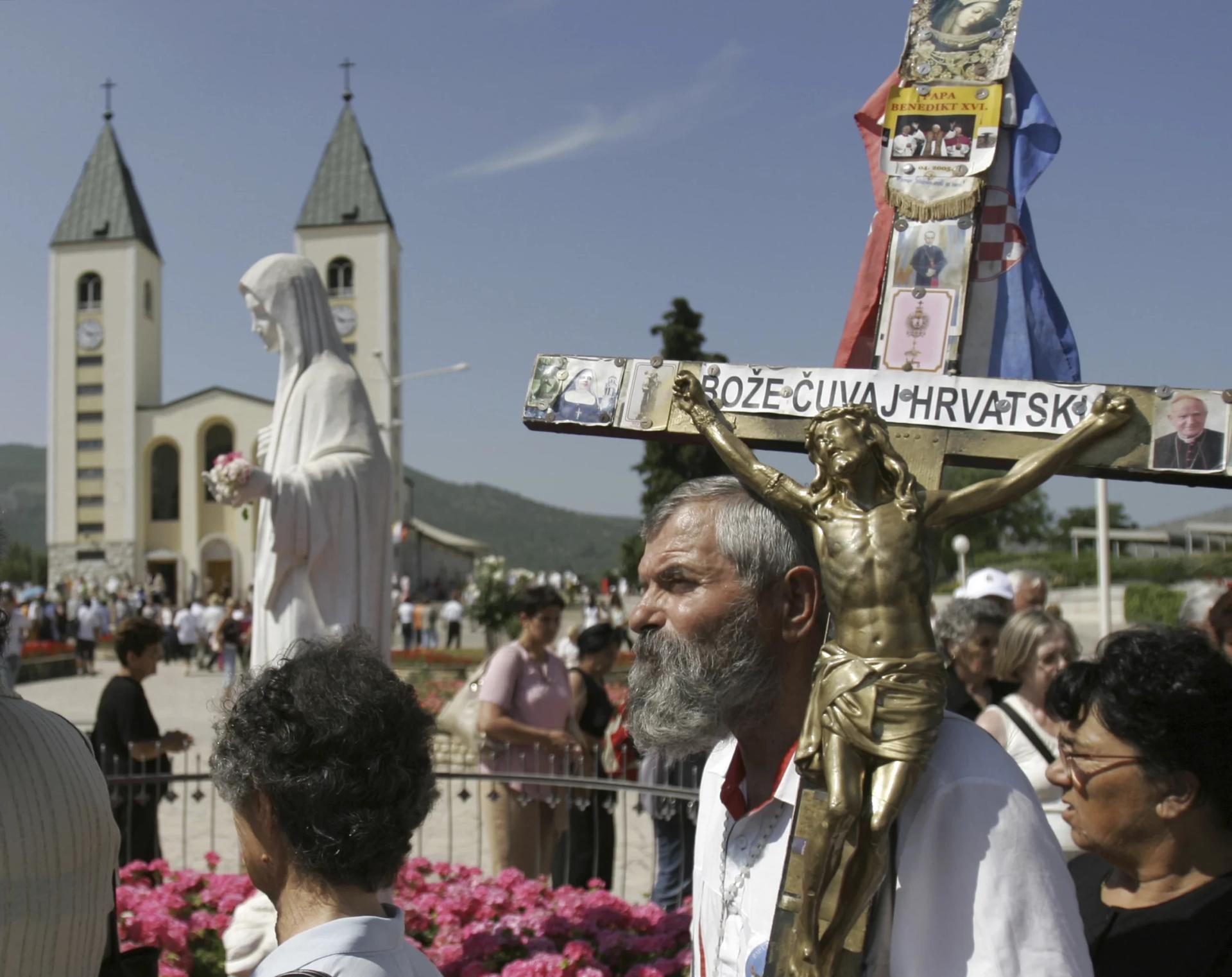アーカイブ
・バチカンで「巨額の不動産不正取引裁判」に勝った検察官、ロンドンでの裁判で”逆襲”も警戒必要

(2024.7.7 Crux Editor John L. Allen Jr.)
ローマ – 古典的なホラー映画には、「死んだと思われた悪役が、ナイフやチェーンソーによる復讐のために戻ってくる」という、”どんでん返し”がある。必要なのは、恐怖の瞬間が終わったと気を抜かず、次の衝撃に備えること。
そしてそれは、バチカンの高位聖職者が関与するロンドンを舞台にした巨額不正疑惑を追及するバチカンの主任検察官アレッサンドロ・ディディが学びつつある教訓だ。
昨年12月、バチカンの”正義の推進者”であるディディは、国務省ナンバー・ツーだったアンジェロ・ベッチュ枢機卿と8人の被告を、ロンドンの不動産をめぐる巨額不正取引にからむ様々な金融犯罪の容疑で起訴し、有罪評決を勝ち取った。勝利に至るまでに、69人の証人、85回の法廷審問、何百万ページものファイルや文書をまとめ、2年半を要した。
ディディはこの間に取った行動について厳しい批判も受けているが、勝利は勝利であり、少なくとも”試練”は終わったように見える。だが問題は、勝利の”予選通過者”が、名実ともに「ピュロス」(多大の犠牲を払ってローマに勝利した古代ギリシャの王)になることができるかどうかだ。
ロンドンの事件では、現在、少なくとも4つの追加の判決が保留されており、その成り行き次第で、全面勝利とはいかなくなる可能性がある。まず、バチカンの裁判で有罪判決を受けた被告の一人であるイタリアの金融家ラファエレ・ミンシオーネが起こした民事訴訟だ。現在、ロンドンの高等法院で審理されている。ロンドンの高級住宅街チェルシーにある大手百貨店ハロッズが所有していた倉庫を4億ドル(現在の為替相場で換算して約620億円)で購入し、高級マンションに改装する計画を、バチカンの国務省に最初に助言したのはミンシオーネだ。
ミンシオーネは、バチカン国務省が約1億4000万ドルと推定される損失を出してこの不動産を売却した取引で、ロンドンの高等法院が、彼が「誠実に行動した」との判断を下すことを望んでいる。そうなった場合、風評被害に対する金銭的補償をバチカンに請求する可能性もある。
昨年11月、高等法院は、バチカン国務省のピエトロ・パロリン長官(枢機卿)、エドガル・ペーニャ・パラ総務局長(大司教)の間で交わされた機密メッセージを、バチカンの代理人弁護士の反対にもかかわらず、引き渡すよう命じる判断を出しており、すでにバチカンが外部に恥をさらす結果になっている。
今週、ペーニャ・パラ総務局長はこの事件で証言するためにロンドンに来て、ミンシオーネの代理人であるチャールズ・サメック弁護士の尋問に直面する。尋問は、バチカンの裁判で有罪判決を受けたアンジェロ・ベッチュ大司教の後任である総務局長がロンドンの取引でミンシオーネの代わりを務めたもう一人のイタリア人実業家、ジャンルイジ・トルツィとのやり取りに焦点が当てられそうだ。
この際、英国の法廷はこれまでロンドン事件に関して、バチカンに必ずしも友好的ではなかったことを想起する必要がある。2021年3月、ロンドンの刑事法院のトニー・バウムガートナー判事は、「バチカンの提出書類は非開示と虚偽の陳述に満ちており、ぞっとする」と強く批判したうえで、「バチカンはトルツィが犯罪行為で有罪であると信じる合理的な根拠を示さなかった」と結論付けた。
ディディはロンドンの裁判の結果を待っているが、彼はまた、現実世界にも影響を与える可能性のある、より知的で学術的な別の面での課題にも直面している。
2021年にこの事件のバチカンでの裁判が始まって以来、多くの法律家や法学者が、「基本的な適正手続きの保護が侵害されている」という主張を含め、正当性に異議を唱えてきた。そして、手続きの冒頭で教皇フランシスコから出された4つの有名な「詔勅」、つまり法令が、検察側に有利な”デッキ”を積み上げた、と主張している。
このような根強い批判の中で、ディディは最近、「Annali di Diritto Vaticano(バチカン法の年代記)」のページで長い弁護をせざるを得ない、と感じるようになった。そして、先週、ボローニャ大学の教会法と民法の専門家、バチカンの立法文書評議会の顧問であり、イタリア政府の「宗教の自由と宗教団体との合意に関する委員会」の委員長のジェラルディーナ・ボニから痛烈な非難を浴びた。
4日付けのローマの新聞「Il Messaggero」に掲載されたインタビューで、ボニは、「詔勅は予備調査のみに関係しており、裁判の完全性を損なうものではない」とするディディの主張を強く批判。「捜査と裁判は密接に関連しており、捜査中に行われる活動は、関係者の基本的な保障を侵害できない… この原則は自然法と教会法の両方に基づいている」と主張し、「バチカンの刑事司法制度の欠陥が是正されない限り、その評決がイタリア国家によって承認されず、欧州人権裁判所による制裁に直面するリスクがある」と警告している。
ディディが直面する可能性のある”第3の評決”は、現在バチカンのローマ控訴院で進められている「世紀の裁判」における有罪判決の再審理だ。被告側は有罪判決に異議を唱えただけでなく、ディディ自身も判決を不服として控訴し、被告が「詐欺を成し遂げるために組織的かつ承知の上で行動した」という彼の主張を裁判所は十分に支持していない、と主張している。(裁判官は昨年12月に結論の要約を発表したが、評決の全文は秋までに完成しない見通しだ)。
バチカンの有罪判決が覆されることはないが、ベッチュは5月にドイツの新聞「Die Zeit」のインタビューで、そのような結果を希望する、と述べている。現実には、バチカンの控訴院が法廷の認定を脇に置くことは稀であり、ましてや、これほど世界の注目を浴びている事件の場合はなおさらだが、ディディは自分の法理論の評価を求める結果となったことを後悔することになるかもしれないし、たとえ判決自体が覆されなくても、検察の行き過ぎを批判される可能性がある。
この裁判に関連して、バチカンのリベロ・ミローネ元監査室長が2017年にベッチュと当時のバチカン憲兵隊長、ドメニコ・ジアーニからの圧力で辞任を余儀なくされたことについて、約1000万ドルの損害賠償を求めているという”奇妙”な案件もある。
ミローネは1月にバチカンの法廷での最初の訴訟で敗訴し、先週の4日、バチカン控訴院は、彼の控訴を取り下げるかどうかを検討するために簡単な審理を開いた。裁判官が訴訟手続きを拒否した場合、ミローネは、現在、ケビン・ファレル枢機卿が率いるバチカン市国最高裁判所に上訴する選択肢を持つことになる。
ディディは、ミローネの主張が最初に提起された時、「時効によって禁止されるべきである」と主張して反対し、監査室長在任中に他のバチカン職員をスパイした疑いで告発すると警告している。(ミローネは、「バチカンとの契約や雇用慣行に関するイタリアの公文書を監査室が調査するのを手伝わせるために、イタリアの調査会社ファルコを雇っただけで、違法な監視とは無関係だ」と主張している。)
ミローネがバチカンの法廷から満足を得る可能性は低いかもしれないが、ディディの事件への関与は、ディディの動機と戦術の両方が疑問視する新たな”戦線”を開くかもしれない。
公平を期すために言っておくと、ローマのベテラン弁護士であるディディは、この仕事を引き受けた時、この仕事が危険であることを知っていたに違いない。だから、バチカンが過去最大の刑事裁判で勝てるとは想像していなかったろうが、それでもなお、「”戦い”に勝っても、”戦争”には負けるリスク」を負ってもいるのだ。
・教理省、教皇と第二バチカン公会議の正当性を拒否した元駐米大使のヴィガノ大司教に破門判決
(2024.7.5 バチカン放送)
バチカンの教理省が5日、元駐米大使のカルロ・マリア・ヴィガノ大司教に対して、教皇と第二バチカン公会議の教えの正当性と権威を拒否する主張を繰り返している、として、破門の判決を下し、本人に伝えた。
ヴィガノ大司教は、「シズマ」(教会の分裂)を招く態度をとっていると告発され、教理省はその教会法上の裁判の判決を下す会議を4日に開いた。会議では、大司教の公的な主張が「教皇を承認し従うこと、教会のメンバーとの交わり、第二バチカン公会議の教えの正当性と権威を拒否する」ものであり、「シズマに相当する罪と認められた」と結論した。。
大司教は、ここ数年、教皇と第二バチカン公会議の正当性を認めない主張を繰り返していた。破門制裁を受けた者は、感謝の祭儀やその他の秘跡の執行、秘跡の受領、準秘跡を授けること、他の典礼祭儀の挙行、これらの祭儀への積極的参加、教会の職務、任務等の執行、統治行為などが禁止される。破門は、悔い改めへと招くもので、”薬”としての処罰であり、その人が再び交わりへと戻ることを常に待つもの、とされている。(編集「カトリック・あい」)
・・・・・・・・・・・・・
Archbishop Carlo Maria Vigano, Apostolic Nuncio to the U.S., listens to remarks at the U.S. Conference of Catholic Bishops’ annual fall meeting in Baltimore, Nov. 16, 2015. (Credit: Patrick Semansky/AP
(2024.7.5 Crux Senior Correspondent Elise Ann Allen)
ローマ 発– 皮肉なことに、米国の独立記念日である4日、バチカンの教理省で会議が招集され、分裂の罪で告発された元駐米大使が破門された、と正式に決定した。
教理省は5日の声明で、イタリア人のカルロ・マリア・ヴィガノ大司教は2011年から2016年まで駐米大使を務めたが、今から6年前から教皇フランシスコが虐待を隠蔽を非難した、などとして退任を求めていた。
大司教は教理省から、6月20日にバチカンに出頭し、「カトリック教会との交わりを維持するために必要な要素、すなわち教皇フランシスコの正当性の否定、同法王との交わりの断絶、第2バチカン公会議の拒否を否定する自身の公的発言」による「分裂の容疑」に答えるよう召喚されていた。
大司教はこの召喚に応じず、ソーシャルメディアで命令を公開し、自分に対する容疑は「名誉」だと語っていた。
5日の声明で、教理省は、4日に開催された会議で「ヴィガノ大司教が教皇を認め、服従することを拒否し、教皇に従う教会のメンバーとの交わりを拒否し、第二バチカン公会議の正当性と教権を拒否する公の発言はよく知られている」としたうえで、刑罰手続きの終了時に「大司教は、『分裂の留保された犯罪』で有罪とされた」と述べ、大司教を、自身の教会分裂行為によって破門される「a latae sententiae破門」に処する、と宣言した。
・・・・・・・・・・・
長年バチカンで働いてきたヴィガノ大司教は、2018年8月にダブリンで開かれ世界家族会議で初めて世界的な”悪名”を馳せた。
この月に大司教は、教皇フランシスコのアイルランド訪問の最終日に合わせて、同国で多くの聖職者が性的虐待問題を起こし、教会に対する不信感が高まっていたのを背景に、11ページの「証言」を発表。未成年者への性的虐待と成人神学生への性的嫌がらせで告発された元枢機卿のセオドア・マカリックの犯罪を、教皇が隠蔽したと非難し、「教皇は、マカリックに対する告発を知りながら、本人の聖職や旅行に対する制限を緩和した」と主張。教皇の引責辞任を求めた。また、バチカン内に”同性愛文化”が広がっている、 とも主張した。
それ以来、大司教は、教皇フランシスコの「教義上の異端や権力の乱用」を問う公開書簡を一貫して発表し続け、また、第2バチカン公会議が決定した教会改革や典礼改革の多くを拒否し、その決定を受けた伝統的なラテン語ミサを制限する教皇の決定を批判した。
駐米大使に任命される前、ヴィガノ大司教はバチカン市国の次官として勤務していた際に、同市国の過剰支出や管理不行き届きを暴露しようとしてローマで波紋を呼び、内部告発者としての評判を得たが、一方で、多くのバチカン内部関係者から、「一緒に仕事をするのが難しい、気難しい性格」の持ち主と見られていた。
大司教は教理省から6月20日に出頭を求められた直後、「現時点ではカトリック教会において法的身分を有しておらず、同会の聖職者は、教会において適法に使徒職を果たすことが出来ない」と教理省が判断する、伝統主義の聖ピオ十世会(SSPX)の会員になった、との噂があったが、SSPXは、「大司教の発言は、本会の創設者が破門にされた行為を超えている」として大司教と距離を置く立場を表明している。
SSPXは6月24日の声明で、教皇フランシスコが教皇に選出された際に「同意の欠陥」があった、と述べた大司教の声明について、「大司教によれば、ベルゴリオ枢機卿は教皇職を実際とは異なるものとみなし、完全に同意することなく教皇職を受け入れたが、この誤りにより、彼の受け入れは無効となった。したがって、フランシスコの教皇職は”仮の地位”となるだろう」と述べた。
(翻訳・編集「カトリック・あい」南條俊二)
・・Cruxは、カトリック専門のニュース、分析、評論を網羅する米国のインターネット・メディアです。 2014年9月に米国の主要日刊紙の一つである「ボストン・グローブ」 (欧米を中心にした聖職者による幼児性的虐待事件摘発のきっかけとなった世界的なスクープで有名。映画化され、日本でも全国上映された)の報道活動の一環として創刊されました。現在は、米国に本拠を置くカトリック団体とパートナーシップを組み、多くのカトリック関係団体、機関、個人の支援を受けて、バチカンを含め,どこからも干渉を受けない、独立系カトリック・メディアとして世界的に高い評価を受けています。「カトリック・あい」は、カトリック専門の非営利メディアとして、Cruxが発信するニュース、分析、評論の日本語への翻訳、転載について了解を得て、掲載しています。
Crux is dedicated to smart, wired and independent reporting on the Vatican and worldwide Catholic Church. That kind of reporting doesn’t come cheap, and we need your support. You can help Crux by giving a small amount monthly, or with a onetime gift. Please remember, Crux is a for-profit organization, so contributions are not tax-deductible.
・9月2日からの教皇、東南アジア・オセアニア4カ国訪問の詳細日程発表

(2024.7.5 バチカン放送)
教皇フランシスコが9月に予定される東南アジア・オセアニア4カ国訪問の詳しい日程が5日、発表された。9月2日(月)から13日(金)まで、各国元首とカトリック教会からの招待に応え、インドネシア、パプアニューギニア、東ティモール、シンガポールを司牧訪問される。
この歴訪の行程は次のとおり。
【インドネシア(9月3日‐6日)】
2日(月=ローマから、最初の訪問地、インドネシアのジャカルタに向け出発=3日(火)スカルノ・ハッタ国際空港に到着。空港で歓迎式=4日(水)ジャカルタ市内の大統領官邸(ムルデカ宮殿)で歓迎式典、大統領への表敬、インドネシア各界代表および駐在外交団と会見。ローマ教皇庁大使館で、イエズス会関係者との私的な集い。カテドラルで同国の教会関係者との出会い。若者の家「グラ・ペムダ」でスコラス・オクレンテスの青年たちと交流=5日(木)ジャカルタ市内のモスクで諸宗教代表と会見。インドネシア司教協議会本部で、奉仕活動の支援を受けている人々との出会い。ゲロラ・ブン・カルノ・スタジアムでミサ=6日(金)スカルノ・ハッタ国際空港で送別式、次の訪問国パプアニューギニアのポートモレスビーへ。
【パプアニューギニア(9月6日‐9日)】
6日(金)教皇、パプアニューギニアのポートモレスビー・ジャクソン国際空港に到着。空港で歓迎式=7日(土)ポートモレスビー市内のガバメントハウスに総督を表敬訪問。国際会議場APECハウスでパプアニューギニアの各界代表及び駐在外交団との会見。カリタス・テクニカル・セカンダリースクールで子どもたちとの出会い。扶助者聖母巡礼聖堂でパプアニューギニアおよびソロモン諸島の教会関係者との集い=8日(日)ポートモレスビーのローマ教皇庁大使館で首相と会見。サー・ジョン・ギーズ・スタジアムでミサ。ポートモレスビーからバニモへ。バニモのカテドラルで同教区の信者たちとの出会い。学校で宣教師たちと私的な集い。再びポートモレスビーへ=9日(月)ポートモレスビーのサー・ジョン・ギーズ・スタジアムで若者たちのとの集い。ジャクソン国際空港で送別式。東ティモールのディリへ。
【東ティモール(9月9日‐11日)】
9日(月)教皇、東ティモール・ディリのプレジデンテ・ニコラウ・ロバト国際空港到着。空港で歓迎式。ディリ市内の大統領官邸で歓迎式典、大統領への表敬、東ティモール各界代表および駐在外交団と会見=10日(月)ディリ市内の学校で障害児との出会い。カテドラルで教会関係者との集い。ローマ教皇庁大使館でイエズス会関係者と私的にお会いに。タシ・トルの広場でミサ=11日(火)ディリのコンベンションセンターで若者たちとの出会い。プレジデンテ・ニコラウ・ロバト国際空港で送別式。シンガポールへ。
【シンガポール(9月11日‐13日)】
11日(月)教皇、シンガポール・チャンギ国際空港到着。空港で歓迎式。黙想センターでイエズス会関係者と私的な集い=12日(火)国会議事堂で歓迎式典。大統領への表敬。首相と会見。シンガポール国立大学・文化センターで各界代表および駐在外交団と会見。競技場シンガポール・スポーツ・ハブでミサ=13日(水)カトリック系施設に高齢者と病者を訪問。カトリック・ジュニア・カレッジで諸宗教の若者たちとの出会い。チャンギ国際空港での送別式を経て、ローマへの帰途に。
・7月は教皇の一般謁見お休みに、日曜正午の祈りは継続
(2024.7.3 バチカン放送)
教皇フランシスコの水曜恒例の一般謁見は、夏期の慣例に従って、7月中はお休みになる。8月7日から再開される。日曜正午のお告げの祈りは、7月中も毎週行われるが、7月7日は、教皇がイタリア・トリエステを訪問されるため、お告げの祈りは現地でのミサの後半に行われる予定。
・「『正義の戦争』の概念の見直しを検討中」-パロリン国務長官が言明

また、ダモッソ記者の著書について、「興味深い方法で、平和への深い願いを前面に出しています… 多くの人々とのインタビューから浮かび上がるのは、平和に関する総合的な分析です」と評価し、ジャーナリストの徹底的な調査が「教会は紛争を止める本当の力を持っていないが、憎しみと敵意の壁を打ち破るために行動するよう、すべての人間の良心に呼びかけることができ、友愛こそ正義、連帯、包摂、地球への配慮への真の道であることを示すことができる」と指摘した。
授賞式に先立って、国務長官は数人のジャーナリストと話をし、ウクライナと中東の紛争について問われると、「これらの戦争は決して正義の戦争ではありません」とし、エルサレムの正義と平和委員会の声明に言及したうえで、「自衛の戦いとしての正義の戦争という概念について、今日多くの議論があります。しかし、現在使用可能な武器(の多様化、高度化)によって、この概念は非常に困難になっており、概念について決定的な立場(を示すこと)はないと思いますが、(カトリック教会としての)の概念の見直しを検討中です」と語った。
(以下、英語原文のまま)
Lebanon urgently needs a new president
The Secretaqry of State also commented on his recent visit to Lebanon. Asked about the possible solutions he envisages for the Lebanese crisis, he remarked that the priority at the moment is the election of the new President of the Republic: “The most important thing is having a president, closing this institutional crisis which is damaging the whole country”, he said.
He also expressed his hope that Chrsitians may play an active role within the Lebanese system. “(The election) certainly won’t be the magic solution, but we will begin to address the problems when all the institutional rolesare filled,” he stated.
Cardinal Parolin confirmed that Maronite Cardinal Mar Bechara Boutros Al-Rai is an active actor in this context, “He has always tried to unite Christians and it seems that there is a willingness on the part of the Christian parties to unite, to propose one or more commonly accepted candidates”.
Asked if there is dialogue with the Shiite community, Cardinal Parolin implied that dialogue is not lacking, but the problem is above all on the side of Hezbollah: “They are stake-holders in the game and have their candidate. The question is finding a candidate that it is accepted by all parties”, he said.
Release of prisoners could help peace process in Ukraine
Cardinal Parolin also spoke about Ukraine, and was asked about the proposal presented by the Hungarian Prime Minister Orbán to Ukrainian President Zelenskiy, in his capacity as rotating president of the European Union, for an immediate ceasefire to facilitate a peace negotiation. “As far as I know, until now the Ukrainians have always refused”, said the Vatican Secretary of State. He recalled hat for the Ukrainian government if there are no guarantees “this could only be a pause to then start again in an even cruder, harsher way.”
However, Cardinal Parolin, reiterated the Holy See’s hope that there “can be a truce, and then a negotiation”.
Regarding the exchange of prisoners for which the Holy See has successfully mediated, Cardinal said that he foresees other releases “because – he explained – it is a mechanism that works which is distinct from that of children, where there are various realities involved. In the case of prisoners it is essentially an exchange of lists that are delivered to the two parties, so I imagine that this activity will continue a little which I believe is very positive and which can create conditions that could also favour peace and possible negotiations”, he said.
We need values to preserve democracy
Finally, in his conversation with the reporters, Cardinal touched on the 50th Italian Social Weeks in Trieste, which kicked off on Tuesday and will see the participation of Pope Francis on July 7.
In this regard the Secretary of State remarked that the theme chosen for this edition focused on democracy is particularly relevant at this time “because – he noted – democracy is facing a crisis in many parts of the world and I believe that it is also very important for Catholics to reiterate the importance and need to be in favour of democracy and above all to fill it with values.”
“Democracy – he noted – is not a simple mathematical exercise, who has more and who has less, but is above all an exercise of values, it is about drawing inspiration the values that make social coexistence possible. Therefore, I believe that the contribution that Catholics can make is very valid, I hope that something good comes from these social weeks,” Cardinal Parolin concluded.
(翻訳・編集「カトリック・あい」南條俊二)
・今年3回目の枢機卿顧問会議(C9)、「女性の教会での役割拡大」「未成年者保護」など協議して閉幕
(2024.6.18 Vatican News Alessandro De Carolis)
今年3回目の枢機卿顧問会議(C9)が17、18両日、教皇フランシスコ出席のもとに行われ、教会における女性の役割と未成年者の保護の問題に焦点が当てられた。
教会における女性の役割では、「女性について」ではなく「女性と共に」考えることが、考察と議論のテーマとなり、初日の17日には、修道女と二人の大学教授2人が基調報告を行った。
バチカン報道局が18日発表したところによると、報告者はシスターLinda Pocher、南スイス応用科学芸術大学のValentina Rotondi教授、イタリアのピアセンツァのアルベロ―ニ神学研究所のDonata Horak教授。Rotondi教授は、「世代間の深い関係という文脈で、経済をケアと適切な管理としてとらえるというビジョンを強調」し、Horak教授は「教会法に関するより広範な考察の文脈で、正義と慈悲、協議権と審議権、階層原理と聖体拝領の教会論、民主化と君主制モデルなど、さまざまな二律背反」を指摘した。
発表によると、これを受けた会議の議論では、キンシャサ大司教のフリドリン・アンボンゴ・ベスング枢機卿が、C9がテーマとしてこれまで4回にわたって女性の役割を取り上げたことを振り返り、「私たちの教会では、ミサに参加する信徒の半分以上が女性であるにもかかわらず、教会で責任を持たされる女性はほとんどいない」としたうえで、「教会における女性の役割をもっと広げていかねばならない、ということが、これまでの基調報告や議論を通じて改めて明らかになった… 教皇が言われるように、『教会は女性』であり、教会共同体で『母性』が重視されなければならない」と述べた。
またボンベイ大主教のオスワルド・グラシアス枢機卿も、女性の教会における役割の重要性を高めていく必要があることに同意し、「私はインド出身だが、インドの一部の地域では女性の重要性は低く、『二流』扱いされている。今、教会はそれを改め、女性に、家族、社会、政治における適切な地位を与えるよう取り組んでいる」と説明。教会における女性のリーダーシップには「多くの可能性がある。私の経験では、女性は、男性が考えない視点で問題に対処できることを何度も経験している。女性の教会における役割の拡大に大いに期待している」と語った、という。
2日目、18日の協議では、ボストン大司教のショーン・パトリック・オマリー枢機卿による「未成年者保護委員会の活動によって開かれた保護の分野での展望」に関する報告も行われ、グラシアス枢機卿は、この分野における「司教会議の活動と運営方法」に焦点を当てた意見を述べた。
最後に、「公会議の枢機卿たちが出身する世界各地の状況、特に現在起こっている紛争」に焦点を当てた意見交換もされた。次回は今年12月の予定。
枢機卿顧問会議のメンバーは2023年3月7日に刷新され、現在は以下の枢機卿によって構成されている。国務長官のピエトロ・パロリン枢機卿、バチカン市国およびバチカン市国行政区の教皇庁委員会の議長フェルナンド・ベルゲス・アルザガ枢機卿、キンシャサ大司教のフリドリン・アンボンゴ・ベスング枢機卿、ボンベイ大司教のオスワルド・グラシアス枢機卿、ボストン大司教のショーン・パトリック・オマリー枢機卿、バルセロナ大司教のフアン・ホセ・オメラ・オメラ枢機卿、ケベック大司教のジェラルド・ラクロワ枢機卿、ルクセンブルク大司教のジャン=クロード・オロリッシュ枢機卿。およびサンサルバドルデバイア大司教セルジオダロシャ。書記はクレシマの名誉司教マルコメリーノ司教。
(翻訳・編集「カトリック・あい」南條俊二)
・バチカンが「教皇の役割と首位性の行使に関するキリスト教の他教会との対話」の成果文書発表
(2024.6.13 VATICAN NEWS)
バチカンのキリスト教一致推進省が13日、教皇の役割と教皇の首位性の行使をめぐるエキュメニカル対話の成果をまとめた文書「ローマの司教」を発表した。第二バチカン公会議後の歩みの中、約30年前にヨハネ・パウロ2世教皇の招きに応えて始まった「教皇職をめぐるエキュメニカル対話の成果」をまとめたもの。
文書は、この対話の目的は、「他のキリスト教諸教会と分かち合える教皇の首位性の行使の形を探求することにある」とし、「たとえ、すべての神学的対話が「そのテーマを同じレベルで、あるいは同じ深さで扱った」ものではないとしても、この最も議論されてきた神学問題への新しいアプローチをしるすことは可能」と述べた。
そして、「これらの神学的対話の実りの一つは、歴史的にキリスト教の一致の妨げとなってきた『ペトロをめぐるテキスト』の新たな解読であり、「対話のパートナーたちには、その後の教義的発展の時代錯誤な影響を避け、使徒たちの間でのペトロの役割を再考することが願われた」としている。
*教皇の首位性の起源
議論の中心となっている問題の一つは、ローマの司教の首位性について、カトリック教会は神権的制度と理解しているのに対し、大部分のキリスト教教会はそれを単に人権的制度と解釈している点であり、文書は、「エキュメニカル的な解明は、この伝統的な二分法に新しい視野をもたらすことに貢献した… それは首位性を、神権的、人権的双方の立場から教会に対する神の御旨の一部として、また人類の歴史を通し媒介されたものとして、考えるものだった」と述べた。
*重大な障害は第1バチカン公会議の教義的な定義
そして、「重大な障害は、第1バチカン公会議の教義的な定義に表されるものにあった」とし、「いくつかのエキュメニカル対話は、第2バチカン公会議の歴史的背景と教えに照らし、この公会議の再読に取り組む上での有望な進展をしるした」。そうして、教皇の普遍的権限の教義的な定義に、「その範囲と限界を特定しつつ」異なる解釈が与えられ、同様に「無謬性の教義の論述を明確にするとともに、キリスト者の一致は真理と愛における一致であるがために、その目的のいくつかの面に同意し、ある状況下では、教導職の個人的な行使の必要性をも認識した」としている。
だが、これらの解明にもかかわらず、「対話は、無謬性と福音における首位性との関係、全教会の完全性、司教の合議制の行使、および容認の必要について、依然として懸念を表明している」ことを認めている。
*教会の和解のための役務
多くの神学的対話は、「普遍的なレベルでの首位の必要」を認めているが、一部の対話では、「使徒的伝承に言及しつつ、教会のその起源から、キリスト教は特定の位階を占めるいくつかの使徒座の上に成り立ち、その使徒座の間でローマが首位である」との主張がされ、またいくつかの対話は、「教会生活のあらゆるレベルにおいて首位とシノドスの間に相互の依存があること」を強調している、と指摘。
*首位性とシノドス性
さらに文書は、対話の恩恵があったもう一つの議題は、実際的な性質のテーマで、「グロバリゼーションと宣教上の必要」という今日的状況に関連したもの、とし、「対話を通し、21世記における首位性の行使のためのいくつかの原則が見極められた」と述べた。
最初の一般的な合意は、「教会のあらゆるレベルでの、首位とシノドスとの間にある相互の依存と、それに伴う首位の協働的な態度の必要」であり、次に、「すべての信者の信仰感覚に基づく『共同体的』な側面と、特に司教の共働性に表される『シノダル(共働的)』な側面、そして、首位権的機能によって表される『個人的』な側面」のつながりに関するもの。
多くの対話の中では「地方レベルと普遍レベルにおける首位性の行使のバランスの必要」が強調され、総主教たちによる古代教会のモデルからインスピレーションを受けた、地方分権化への招きがあった。
相互援助の原則も強調され、「ローレベルで適切に対応できる問題は、ハイレベルにもたらされることはない」。また、いくつかの対話は、カトリック教会との「多様性における一致」の受け入れ可能なモデルを定義するためにこの原則を適用している。
*作業をめぐる示唆
これらを踏まえた最初の勧告は、カトリック教会側による、第1バチカン公会議の教えの新たな解釈。ローマの司教の様々な責任、「特に、西方教会における長としての役務と、諸教会の交わりにおける一致の首位的役務」をより明確に区別すること。そして、教皇にとっての部分教会であるローマ教区での役務の行使により重点を置いた考察の必要だ。
もう一つの勧告は、カトリック教会のシノドス性の発展に関するもの。特に「各国および各地域でのカトリック司教協議会の権限と、彼らの共働性との、そしてローマ教皇庁との関係のさらなる考察」だ。また、普遍的レベルでは、「シノドスの歩みにおける神のすべての民のより良い関与の必要性」を強調するものがあった。そして、最後の勧告は、「世界レベルでの諸教会の指導者の定期的会合を通した『和解の交わり』の促進」だ。
(編集「カトリック・あい」)
・教皇がイスラエル、パレスチナの大統領らと「祈りの集い」をバチカンで開いて8日で10年

集いから10年、世界は今、新たな戦争の脅威にさらされ、イスラエルとパレスチナの間でもガザ地区での先の見えない戦闘で多くの犠牲者が出続けている。そうした中で、教皇は「祈りの集い」10周年を迎える8日、バチカン庭園を訪れ、四人で植樹したオリーブの前で、改めて平和を祈られる。
2014年の6月8日の「祈りの集い」は、教皇が同年5月に聖地を巡礼した際、ペレス大統領とアッバス大統領に、一致して平和を祈る機会を呼びかけたことにより実現した。
バチカン庭園で行われた祈りには、教皇と両大統領、そしてバルトロメオス1世総主教をはじめ、ユダヤ教、キリスト教、イスラム教から各使節が参加。三つの宗教それぞれの祈りを通して、人民間に平和の賜物を願い求めた。祈りの後には、4人で、平和の象徴であるオリーブの苗をバチカン庭園に植えた。
(編集「カトリック・あい」)
・教皇の”同性愛者批判の俗語使用”問題で、バチカン広報局長が「教皇は傷ついた方々に謝罪されている」と説明
(2024.5.28 Crux Senior Correspondent Elise Ann Allen)
ローマ 発-教皇フランシスコが20日のイタリア司教協議会の春の総会でのあいさつの中で「同性愛者について下品な俗語を使った」との報道が国際的に広まっている問題で、バチカンのマッテオ・ブルーニ広報局長が28日、記者団の質問に応じ、「教皇に侮辱したり、差別したりする意図はなく、傷ついた方々に謝罪している」と述べた。だが、教皇は実際にそのような言葉を使ったかことについては認めなかった。
マッテオ・ブルーニ局長は、イタリアの司教協議会の春の総会での教皇の発言について、「非公開の場での発言に関するニュースが最近、報道されていることは、虚構は承知しておられる」としたうえで、教皇は常々、「教会には、あらゆる人のための、あらゆる人のためのスペースがある。役に立たない人も、余分な人もいない、すべての人のためのスペースがあります。皆さんも私たちと同じようにです」と語っておられ、「同性愛を嫌悪するような言葉で、人々の気分を害したりする意図は一度もなかった。その言葉の使用によって気分を害したと感じた人々に謝罪している」と説明した。
教皇とバチカンは、イタリアのブログDagospiaに、イタリア司教協議会の春の総会で教皇が「同性愛者を指す卑劣な俗語を使用した」との記事が掲載されて以来、世界中に転電されて、広範な批判にさらされている。
(

記事によると、この総会でのあいさつで、教皇は、同性愛者の男性のカトリック神学校への入学を認める問題について言及され、「神学校では、 frociaggine(男性同性愛者に対する差別的な俗語、日本語の「オカマ}に相当)が多すぎる」と語られて、この面での注意を促した、としている。
この報道は世界中に転電されて、教皇に対する反発を引き起こし、カトリック教会における同性愛者受け入れの擁護者とみなされてきた教皇が、明らかにそのような粗暴な言葉を使ったと受け取られ、中には大きなショックを受ける人も出た。
ブルーニ局長は記者団に、この騒動の責任を認めて謝罪した。だが、教皇がこの言葉を使用したことについては認めるには至らず、これは、教皇がこの俗語を何気なく使用したことをバチカンが正式に認めていないことを意味している。
教皇の言葉は、神学校での(同性愛者の増加など)憂慮すべき事態に対応するイタリア司教協議会が策定した新たな神学校入学ガイドラインを評価する最中に発せられた。
(翻訳・編集「カトリック・あい」南條俊二)
・・・・・・・・・・・・・・・・・・・
教皇に侮辱の意図なし「教会には皆に居場所がある」
(2024.5.28 バチカン放送)
バチカンのマッテオ・ブルーニ広報局長は28日、報道関係者の問いに答える形で、「教皇フランシスコはイタリアの司教らと行った非公開の対話をめぐる記事をご存知です」と述べ、教皇は人を侮辱したり、同性愛者に対する差別的な表現をする意図は決してなく、「傷ついた方々に謝罪されている」と、以下のように説明した。
「教皇フランシスコは、イタリア司教協議会の司教らと非公開で行った対話をめぐる最近の記事についてご存知です。教皇は、多くの機会において『教会には皆に、すべての人に居場所がある。 不要な人はなく、無駄な人はいない。誰もが、ありのままの姿で、受け入れられるゆとりがある』」と強調されてきました。教皇は人を侮辱したり、同性愛者に対する差別的な表現をする意図は決してなく、他者によって伝えられた言葉によって傷ついた方々に謝罪されています」。
・「新規範で”メジュゴリエでの聖母マリアご出現”に早期結論を期待」と教理省長官

Pilgrims walk around a statue of the Blessed Virgin Mary near the church of St. James in Medjugorje, Bosnia and Herzegovina, around 75 miles south of the Bosnian capital of Sarajevo on Sunday, June 25, 2006. On Friday, May 17, 2024, the Vatican issued revised norms for discerning apparitions “and other supernatural phenomena,” updating a set of guidelines first issued in 1978. (Credit: Amel Emric/AP.)
Senior Corresponden Elise Ann Allen)
ローマ – バチカン教理省のビクトル・マヌエル・フェルナンデス長官は17日、聖母マリアの御出現やその他の霊的現象の信憑性を評価するための新たな規範を発表した。その際、記者団に対して、ボスニア・ヘルツェゴビナのメジュゴリエでの「聖母マリアの出現」については引き続き調査、検討中であることを明らかにした。
新規範は、バチカンが幻影やその他の同様の霊的出来事を本質的に「超自然的」なものとはみなさなくなると規定。代わりに、「Nihil Obstat(何も支持されない)」 「Prae oculis habeatur(肯定的な兆候が認められる)」など、6 つの可能な判定のうちの 1 つを採用する、としている。
カトリック教会で長期の議論の焦点となってきたメジュゴリエの聖母マリアのご出現は、1981 年 6 月に 当時10歳から17歳までの若者6人に毎日のように幻影が現れ、その後の幻視者の一部は1989年以来、時々毎日出現していると主張した。一連の最初の御出現はすべて同じ場所で起こったとされているが、「今でも、聖母マリアからメッセージを受け取っている」と主張する予言者たちは、さまざまに異なる時間と場所で聖母を見ると述べている。
2010年、教皇ベネディクト16世は、ローマ司教代理だったカミッロ・ルイニ枢機卿をトップとする委員会を設置。同委員会は2014年に「ルイニ報告書」と呼ばれる報告書を教皇フランシスコに提出した。フランシスコはこの問題について、2017年5月のポルトガルのファティマ訪問から帰途の機中会見で、記者団に「最初のメジュゴリエの聖母マリアご出現は、現在進行中の出現と区別すべきです」としたうえで、この報告書は、「(最初にご出現を見たとする人々が)若かった頃の出現について、調査を継続する必要がある、としていますが、現在進行中とされる出現については、疑問を表明しています」と語っていた。
そして同年、ポーランドのヘンリク・ホーザー大司教を担当に任命、大司教は翌2018年5月、フランシスコ会が管理・運営するボスニア・ヘルツェゴビナのメジュゴリエの聖ヤコブ教区に「使徒訪問者」として出かけ、2020年5月に教皇が「メジュゴリエへの巡礼は許容される」との判断を出す一方、バチカンは声明で、「ご出現とされるものの真偽についての研究はまだ進行中であり…、巡礼が教義的な面で混乱や曖昧さを引き起こすことは避けなければならない」と述べていた。
フェルナンデス長官は17日の記者会見で、幻視者自身が「”超自然的”であるとみなされる場合、その人物に聖人としての地位を求める傾向がある」とし、それがバチカンが超自然現象に関する判断を下さない「もう一つの理由」だと言明。”メジュゴリエのご出現”は「その起源においては危険ではなく良いものであると考えられるが、その後の発展においては問題を引き起こす可能性があることを心に留めておいていただきたい」と関係する信者たちに求めるとともに、新たな規範によってこの問題について速やかな結論が出ることを期待する、と述べた。
(翻訳・編集「カトリック・あい」南條俊二)
・・Cruxは、カトリック専門のニュース、分析、評論を網羅する米国のインターネット・メディアです。 2014年9月に米国の主要日刊紙の一つである「ボストン・グローブ」 (欧米を中心にした聖職者による幼児性的虐待事件摘発のきっかけとなった世界的なスクープで有名。映画化され、日本でも全国上映された)の報道活動の一環として創刊されました。現在は、米国に本拠を置くカトリック団体とパートナーシップを組み、多くのカトリック関係団体、機関、個人の支援を受けて、バチカンを含め,どこからも干渉を受けない、独立系カトリック・メディアとして世界的に高い評価を受けています。「カトリック・あい」は、カトリック専門の非営利メディアとして、Cruxが発信するニュース、分析、評論の日本語への翻訳、転載について了解を得て、掲載しています。
Crux is dedicated to smart, wired and independent reporting on the Vatican and worldwide Catholic Church. That kind of reporting doesn’t come cheap, and we need your support. You can help Crux by giving a small amount monthly, or with a onetime gift. Please remember, Crux is a for-profit organization, so contributions are not tax-deductible.
・バチカンが、2025年「希望の巡礼」の聖年に”聖地巡礼”などを全免償とする規範発表(Crux)
(2024.5.14 Crux Senior Correspondent Elise Ann Allen)
ローマ 発– バチカンは13日、「希望の巡礼」をテーマに12月24日から始まる2025年聖年で、個人およびグループによる聖地巡礼によって伝統的な全免償を得るための規範を発表した。
教皇フランシスコは先週発表した2025年聖年の布告勅書で、「 残虐行為と暴力に直面している世界において、免責は特に重要な意味をもつ」と述べられた。人の罪が赦された後に、その一時的な結果を完全に赦す免償は、これまで「神の慈悲の限りなさを改めて認識」するための聖年になされる特別措置の一つとなってきた。
バチカン内赦院長のアンジェロ・デ・ドナティス枢機卿が署名、発表した規範は、信者が免責を受けることのできる通常の条件を概説し、「真に悔い改めることが必要」であり、免責を希望する者は告解し、聖体を受け、教皇の聖年に対する意図のために祈らねばならない。
また、聖年中に全免償を得る主な3つの方法について、①聖年に指定された場所への巡礼②世界の他の神聖な場所への「敬虔な訪問」③慈悲と奉仕の行為を行うこと、と述べている。
「聖年に指定された場所への巡礼」に関しては、信徒はミサへの参加すること、あるいは洗礼秘跡、堅信秘跡、初聖体拝領、病者塗油の秘跡授与のための特別なミサへの参加、聖務日課(教会の祈り)、十字架の道行き、ロザリオの祈り、ギリシャ正教の讃美歌、神の御言葉の祭儀、個人の告白で終わる赦免の祭儀など、これらの聖なる場所でのさまざまな祈りに参加することによっても全免償が得られる 。
全免償は、ローマの 4 つの教皇大聖堂(サン ピエトロ大聖堂、聖マリア大聖堂、聖ヨハネ ラテラン大聖堂、城壁の外の聖パウロ大聖堂)、聖地の 3 つの大聖堂(エルサレムの聖墳墓大聖堂、ベツレヘムの生誕大聖堂、ナザレの受胎告知大聖堂)のいずれかを訪問することによっても、得られる。
*現地司教が指定する大聖堂,聖年の催し会場も対象に
また、これらの場所を訪れることができない信者も、地元の司教が指定する大聖堂やその他の神聖な場所を訪れることで免償を受け取ることができる。個人またはグループで聖年の催しが行われる会場を訪れ、聖体の礼拝と瞑想に参加し、最後に御父に祈り、信仰告白をし、 聖母マリアの祈りを唱える。
特定の聖なる場所以外にも、信者たちは、世界中の多くの聖地を訪れることで全免償を得ることができる。例えば、ローマでは、エルサレムの聖十字架大聖堂、 ヴェラーノの聖ローレンス大聖堂。 サン・セバスティアン大聖堂、 サシアの聖霊教会。 聖パウロが殺されたトレ・フォンターネの聖パウロ教会。カタコンベやサンタ マリア ソプラ・ ミネルヴァ大聖堂、 カンポ・デ・フィオーリの聖ブリジット教会、サンタ・マリア・デッラ・ヴィットーリア教会、トリニタ・デイ・モンティ、トラステヴェレの聖チェチーリア大聖堂、カンポ・マルツィオの聖アウグスティーヌ大聖堂などがある。
イタリアでローマ以外に免償が得られる巡礼地としては、アッシジの聖フランシスコ大聖堂と天使の聖母大聖堂、 ロレートの聖母、ポンペイの聖母、パドヴァの聖アントニオの大聖堂など。
世界中の現地の司教や教区によって指定された小規模な聖堂、大聖堂、またはマリア聖堂、および司教協議会によって指定された国内または国際的な聖域を訪問することによっても、免償は得られる。
*年齢、病い、介護などで巡礼できない人にも出来ることは
年齢や健康上の問題、介護が必要、あるいは修道院や刑務所に収容されているなどの理由で巡礼ができない人たちに対しては、聖父の言葉を唱え、信仰告白をすることで免償を得られる。 自宅、病院、養護施設、刑務所で、自身が体験している苦しみと、聖年の目的に沿った祈りをささげるからだ。
*教会などでの霊的錬成の活動や慈善の行為も対象に
第二バチカン公会議の文書やカトリック教会のカテキズムに基づいて教会などで開かれる宣教活動、霊的錬成、信徒養成に参加する場合も、聖年免償を得ることができる、としている。
伝統的に、聖年中は1日に1回の免償しか得られないが、煉獄の魂に代わって慈善行為を完了し、その日に2回目の聖体を受ける信者は、2回目の免償を得ることができ、 亡くなった信者にも適用される。
また、免償は、飢えた人に食事を与える、刑務所にいる人を訪問する、死者を埋葬する、あるいは迷っている人に助言する、苦しんでいる人を慰める、罪を赦し、耐えるなど、肉体的および精神的な慈悲の業を行うことによっても、得られる。 高齢者、障害者、囚人など、苦しむ人や困難に直面している人たちを「適切な期間」訪問することのよっても得られる。これは、「彼らのうちにおられるキリストへの巡礼」をすることを意味し、信者はこれらの訪問を行うたびに免償得ることができる。
*スマホなどでの”無益な気晴らし”を控えることも
さらに現代的な免償として、スマホなどソーシャルメディアの器具を使った「無益な気晴らし」を控えるなど、具体的な仕方で悔い改めの行為を行うことによっても得られる。こうした禁欲の精神は、「過剰な消費」を控えることも意味し、 貧しい人々に「相応の額」のお金を寄付することや、宗教的または社会的活動、特に生命を守る活動を支援すること、 捨てられた子供たち、困難を抱えた若者、貧しい人々、高齢者、移民の生活の質を支援することも、免償の対象となる。「自由時間の相当部分」を地域社会への奉仕活動やその他の同様の個人的貢献に捧げることでも、免償は得られる。
*現地の司教たちには、信者に対する規範の明確な説明、それぞれの社会文化的な特徴に応じた対応を要請
司教と教区に対しては、聖年の期間中に、信者に免償を与える目的で教皇の祝福を与えるミサを行うこと、特定の大聖堂と教会を巡礼地として指定すること、ミサ中も含め信者が告解をすることのできる機会を増やすことが求められ、また指定された大聖堂や教会で告解を聞く任務を与えられた司祭には、通常は高位聖職者やバチカンに限定される個別の罪について許しを与える特別な権限が認められる。また、教区外の巡礼を先導または同行するすべての司祭に対し、巡礼のどこにいても秘跡を執り行う権限が与えられる。
規範は、司教たちに、それぞれの管轄地域の状況、文化、伝統を考慮して、この規範を信者に明確に説明するよう求め、「各国、各民族の社会文化的特徴に適した教理」を実施するよう促し、そうすることで、「福音とキリスト教のメッセージ全体を効果的に提示し、教会を通じて得られる賜物への願いを人々の心にさらに深く根付かせることになるだろう」と述べている。
(翻訳・編集「カトリック・あい」南條俊二)
・・Cruxは、カトリック専門のニュース、分析、評論を網羅する米国のインターネット・メディアです。 2014年9月に米国の主要日刊紙の一つである「ボストン・グローブ」 (欧米を中心にした聖職者による幼児性的虐待事件摘発のきっかけとなった世界的なスクープで有名。映画化され、日本でも全国上映された)の報道活動の一環として創刊されました。現在は、米国に本拠を置くカトリック団体とパートナーシップを組み、多くのカトリック関係団体、機関、個人の支援を受けて、バチカンを含め,どこからも干渉を受けない、独立系カトリック・メディアとして世界的に高い評価を受けています。「カトリック・あい」は、カトリック専門の非営利メディアとして、Cruxが発信するニュース、分析、評論の日本語への翻訳、転載について了解を得て、掲載しています。
Crux is dedicated to smart, wired and independent reporting on the Vatican and worldwide Catholic Church. That kind of reporting doesn’t come cheap, and we need your support. You can help Crux by giving a small amount monthly, or with a onetime gift. Please remember, Crux is a for-profit organization, so contributions are not tax-deductible.
・バチカン教理省が超自然的現象の識別に関する新規則を発表

(2024.5.17 Vatican News )
教皇庁教理省が17日、超自然的とされる現象をめぐる新しい規則を発表した。19日に発効し、超自然的とされる現象の識別のプロセスを刷新することになる、という。
具体的には、司教も教皇庁も超自然的な現象そのものの定義は宣言せず、信者の信心や巡礼を許可し推進するために、許可から否定に至るまでの6レベルを備えた識別を行う。
これにより、民間信心に対する通達がより早くなり、これまで研究のために非常に長い時間をかけていた「超自然的とされる現象自体の公式な定義」をすることが、通常はなくなる。
もう一つの新しい点は、教理省の従来よりも明確な関与である。同省は司教の最終決定を認可すると同時に、あらゆる時点で教令によって介入する力を持っている。
ここ数十年間、個々の司教が表明した多くの件で、同省の介入は公にされなかった。今回、教理省の積極的な関わりを明白にした動機には、これらの現象をめぐる影響が地域レベルに留まらず、しばしば全国的、あるいは世界的な規模にまで達し、そのために一教区の決定が別の場所でも余波をもたらすことがあったためだ。
*新規則導入の理由
この文書の作成は、ここ100年間の長い経験があった。たとえば、地域の司教が非常に短期間にある現象の超自然性を宣言した後で、教理省がそれとは逆の見解を示したり、一司教がある現象について行った宣言に対して、後継の司教がそれを覆したことがあったりした。超自然的か否かをめぐる決定に至るまで、あらゆる要素を判断するために長い時間を要し、しばしば、信者のために緊急に司牧的回答を与えることの妨げとなっていた。
*霊的な実りとリスク
教理省長官ヴィクトル・マヌエル・フェルナンデス枢機卿は文書の序文で、「多くの場合、これらの現象は、非常に豊かな霊的実り、信仰の成長、信心、兄弟愛と奉仕をもたらした。あるケースでは、今日多くの人々の民間信心の一つの中心をなす、世界中に散らばる巡礼聖堂の原点ともなった」と述べる一方、「超自然的とされる現象のいくつかのケース」では、「信者に害をもたらす非常に重大な危険性」が明らかになったり、超自然的現象とされるものが「儲けや、権力、社会的名声、個人の利益」を引き出し、「人の支配、あるいは虐待」にまで達したりすることがあった、と語っている。
また、そこには「教理的な過ち、福音のメッセージの適切でない書き換え、セクト的な考えの伝播」がある可能性や、神の働きかけとされるある現象が単なる想像や、誇大妄想癖、誰かの偽装的傾向に過ぎないにも関わらず「信者たちがその影響に巻き込まれる」可能性もある、と指摘している。
*超自然的現象とされるものに対する6つの可能な判定
「ある超自然的現象と言われるものの神的起源について、教会当局側からの積極的な公認を想定してはならない」(1章 11節)。それゆえに、通常、「教区の司教も、司教協議会も、教理省も、ある現象が超自然的な起源を持つと宣言することはない。教皇だけが、この意味における手続きを認可することができる」(同 23節)。 識別の後に行われる6つの可能な判定は次のとおり。
①Nihil Obstat:超自然的な信憑性の確実さは表明されないが、聖霊の働きのしるしを認める。
②Prae oculis habeatur:ポジティブなしるしを認めるが、そこには混乱やリスクの要素があり、識別およびそれを受け取る人々との対話が必要とされる。
③Curatur:批判的要素があるが、実証しうる霊的実りと共に現象が広く伝えられている。信者を動揺させる禁令は勧めないが、司教にその現象を刺激しないように招く。
④Sub mandato:問題が現象そのものに関してではなく、人々あるいはグループによるその不当な利用にある。教皇庁は司教あるいは代表者にその地の司牧指導を委ねる。
⑤Prohibetur et obstruatur:いくつかのポジティブな要素にも関わらず、問題とリスクは重大である。教理省は司教にその現象に同調することは認められないと公式に宣言するように命じる。
⑥Declaratio de non supernaturalitate:司教は、具体的な証拠に基づき、その現象は超自然的ではないと宣言することを認められる。
(バチカン放送日本語課訳=「カトリック・あい」編集)
・バチカンで中国の高官や司教が参加するシンポジウム5月21日にー両者の関係に重大な動きの可能性(LaCroix)
People wave a flag of the People’s Republic of China as Pope Francis greets the faithful upon his arrival for a general audience at St. Peter’s Square, Vatican City, 15 June 2016. (Phoo by EPA/ANGELO CARCONI/MaxPPP)
(2024.5.14 La_Croix Loup Besmond de Senneville)
バチカンは5月21日に教皇庁立ウルバノ大学で国際シンポジウムを開くことになり、中国政府・共産党の承認を得てカトリック上海教区長の司教も参加する予定だ。
バチカンと中国政府の関係は、通常、バチカンの”壁の裏”で慎重に議論される問題だったが、新たな展開として、バチカン国務省は5月2日にバチカンと中国の関係に関するハイレベルのシンポジウムを行うことを決めた。10日、このことを密かにオンラインに掲載したが、現在に至るまで、バチカンはこれについてまだ正式発表はしていない。
このシンポジウムは”The 100 Years of the Plenary Council of China: Between History and the Present”と題され、数名の中国高官が出席する重要な政治イベントであり、中国のカトリック教会から上海教区長のジョセフ沈斌(シェンビン)司教が参加する。沈斌司教は2023年4月に中国政府・共産党がバチカンの同意を得ないまま、一方的に上海教区長に任命したため、2018年にバチカンと中国が結んだ司教任命に関する暫定合意に違反する行為だと批判の声もバチカンの関係者からでたが、バチカンはこの人事を追認するかたちで”宥和”を図っていた。
また、中国政府代表として、宗教監督の重要人物、の鄭暁君・中国社会科学院世界宗教研究所所長が参加する。彼女は中国宗教協会の会長でもあり、 2 つの組織は、国内に存在するすべての宗教に「中国の国民的特徴」を与えることを目的とした宗教の「中国化」運動で主導的な役割を果たしている。 この運動は1950年代に毛沢東政権によって始められ、毛沢東政権はバチカンとの国交を断絶した。 今も、中国化を推進する国家主席の習近平氏にとって重要な原動力だ。
鄭暁君が上級会員である中国社会科学院は、中国の宗教に関する学術研究を監督するために1964年に設立された。 この研究所は、自らを「マルクス主義の宗教的観点」に取り組むための基礎的思想を提供しており、「マルクス主義の宗教的見解に関する研究室」が設けられていることは注目に値する。
バチカンと中国の関係に詳しいあるカトリック情報筋は、「このレベルの中国高官がバチカン主催の公的行事に参加するのは前例がない」と語った。 このシンポジウムは、教皇庁立大学、つまりバチカンの「領土内」で開催されるため、政治的重要性はさらに大きく、 「このことは、些細なこととして片づけるものではない」と指摘している。
また、バチカンは、この会議中に教皇フランシスコのビデオメッセージを放映する予定だ。 教皇は中国についてめったに言及されないが、昨年9月に、モンゴルの首都ウランバートルを訪問した際、中国のカトリック教徒に対し「善良な国民」であるよう強く求める発言をしており、これを「バチカンが中国の内政に干渉しないとこと中国政府・共産党に伝えようとしたもの」と受け止める関係者もいた。
5月21日のシンポジウムでは、バチカンのピエトロ・パロリン国務長官・枢機卿が午前の部の締めくくりの演説をし、午後の部の締めくくりにはルイス・アントニオ・タグレ福音宣教省次官・枢機卿が演説を予定している。 二人は物議を醸している中国との司教任命に関する暫定合意の責任者であり、福音宣教省は、中国を含む世界中の教会に対する福音宣教の取り組みを監督する責任を持つ。
La Croixが入手した情報によると、このシンポジウムは、中国とバチカンの関係に関する「重要な発表」につながる可能性もある。 ローマでは、中国政府とバチカンの連絡事務所が開設されるのではないかとのうわさも出ている。 もしこのニュースが確認されれば、中国とカトリック教会の指導者らとの関係において重要な出来事となるだろう。
(翻訳「カトリック・あい」南條俊二)
(注:LA CROIX internationalは、1883年に創刊された世界的に権威のある独立系のカトリック日刊紙LA CROIXのオンライン版。急激に変化する世界と教会の動きを適切な報道と解説で追い続けていることに定評があります。原文はhttps://international.la-croix.comでご覧になれます。
LA CROIX international is the premier online Catholic daily providing unique quality content about topics that matter in the world such as politics, society, religion, culture, education and ethics. for post-Vatican II Catholics and those who are passionate about how the living Christian tradition engages, shapes and makes sense of the burning issues of the day in our rapidly changing world. Inspired by the reforming vision of the Second Vatican Council, LCI offers news, commentary and analysis on the Church in the World and the world of the Church. LA CROIX is Europe’s pre-eminent Catholic daily providing quality journalism on world events, politics, science, culture, technology, economy and much more. La CROIX which first appeared as a daily newspaper in 1883 is a highly respected and world leading, independent Catholic daily.
・教皇フランシスコ、6月にイタリアで開くG7の”AIセッション”に参加


